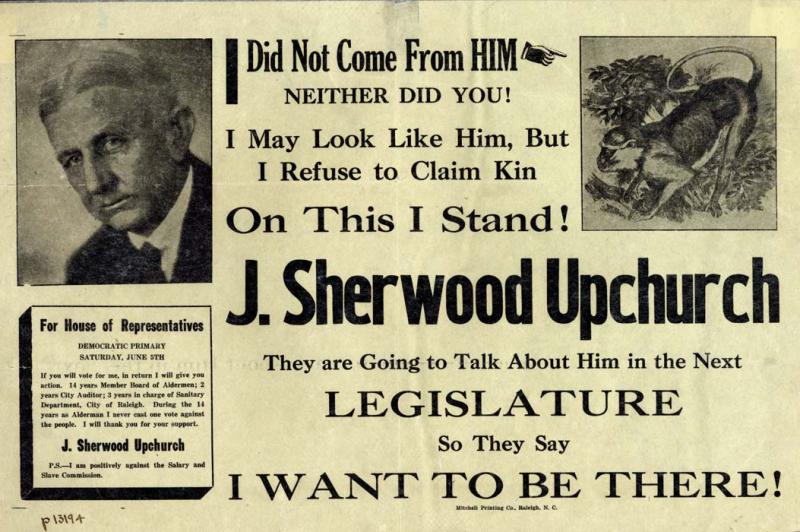Campaign Poster Against Evolution
The debate on evolution began in the 1910s with the increase of fossils and homin bones being found, and the enforcement of Christian teachings in public schools. In 1925, the debate most famously took place in Tennessee's Rhea County Courthouse known as the Scopes Trial. The trial resulted in Scopes, who included evolution in his curriculum was fined $100 and the anti-evolutionists were able to continue to exclude evolution in the classroom.
Clearly Upchurch (1870-1950) was not the only advocate for anti-evolution. William Jennings Bryan was a major supporter for anti-evolution and was part of the Scopes Trial. Six Southern and boarder states such as, Oklahoma and Florida were also opposed to evolution and passed legislation that kept evolution out of public schools.
Transcript for the poster is below the image.
For more on the 1920s evolution debate go to:
https://www.pbs.org/wgbh/evolution/religion/revolution/1910.html
https://www.pbs.org/wgbh/evolution/library/08/2/l_082_01.html

[Campaign Poster Against Evolution]. [1926?]. Poster. UNC Chapel Hill: Documenting the American South. https://docsouth.unc.edu/nc/upchurch/upchurch.html (Accessed December 27, 2018).
I Did Not Come From HIM NEITHER DID YOU!
I May Look Like Him, But I Refuse To Claim Kin
On This I Stand!
J. Sherwood Upchurch
They are Going to Talk About Him in the Next LEGISLATURE
So They Say
I WANT TO BE THERE!
For House of Representatives DEMOCRATIC PRIMARY SATURDAY, JUNE 5TH If you will vote for me, in return I will give you action. 14 years member Board of Aldermen; 2 years City Auditor; 3 years in charge of Sanitary Department, City of Raleigh. During the 14 years as Alderman I never cast one vote against the people. I will thank you for your support.
J. Sherwood Upchurch
P.S.—I am positively against the Salary and Slave Commission.
Mitchell Printing Co., Raleigh, N.C.
Public Domain
Public Domain is a copyright term that is often used when talking about copyright for creative works. Under U.S. copyright law, individual items that are in the public domain are items that are no longer protected by copyright law. This means that you do not need to request permission to re-use, re-publish or even change a copy of the item. Items enter the public domain under U.S. copyright law for a number of reasons: the original copyright may have expired; the item was created by the U.S. Federal Government or other governmental entity that views the things it creates as in the public domain; the work was never protected by copyright for some other reason related to how it was produced (for example, it was a speech that wasn't written down or recorded); or the work doesn't have enough originality to make it eligible for copyright protection.
Add a comment
PLEASE NOTE: NCpedia provides the comments feature as a way for viewers to engage with the resources. Comments are not published until reviewed by NCpedia editors at the State Library of NC, and the editors reserve the right to not publish any comment submitted that is considered inappropriate for this resource. NCpedia will not publish personal contact information in comments, questions, or responses. If you would like a reply by email, note that some email servers, such as public school accounts, are blocked from accepting messages from outside email servers or domains. If you prefer not to leave an email address, check back at your NCpedia comment for a reply. Please allow one business day for replies from NCpedia. Complete guidelines are available at https://ncpedia.org/about.